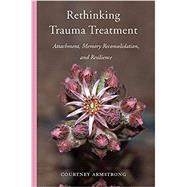Rethinking Trauma Treatment Attachment, Memory Reconsolidation, and Resilience
, by Armstrong, Courtney- ISBN: 9780393712551 | 0393712559
- Cover: Hardcover
- Copyright: 6/25/2019
What makes trauma therapy effective? The answers might surprise you. While therapists have been bombarded with brain science, hundreds of new models, and pressure to use evidence-based techniques, research has demonstrated that the therapeutic relationship ultimately predicts therapy outcomes. This is especially true for traumatized clients. But, what kind of therapeutic relationship? Forming a secure therapeutic alliance with traumatized clients is tricky. How do you help clients trust you after they’ve been abused, betrayed, or exploited? How do you instill hope and convince clients who’ve been devastated by loss to believe that a better life is possible? In this accessible guide, Courtney Armstrong distills discoveries from attachment theory, brain science, and post-traumatic growth into practical strategies you can use to: 1) build trust and a secure therapeutic relationship; 2) transform traumatic memories into stories of triumph and courage; and 3) help clients cultivate resilience and a positive post-trauma identity. Packed with dozens of scripts, step-by-step worksheets, and inspiring client stories, this book gives you tools for each phase of the trauma therapy process and shows you how to:Engage and motivate clients based on their attachment styleManage trauma-related dissociation, anxiety, and angerTransform traumatic memories so they no longer haunt your clientWork with different types of trauma, from sexual abuse to traumatic griefEvoke inner resources for healing and positive emotional statesCounter compassion fatigue and burnout so youcan thrive as a therapist Merely talking about a traumatic event is not enough because the parts of the brain where traumatic, implicit memories are stored don’t understand words. Heartfelt, relational experiences catalyze brain change and buffer the impact of trauma. In this book, Armstrong demonstrates that neuroscience is validating what therapists have suspected all along: the brain changes through the heart.







